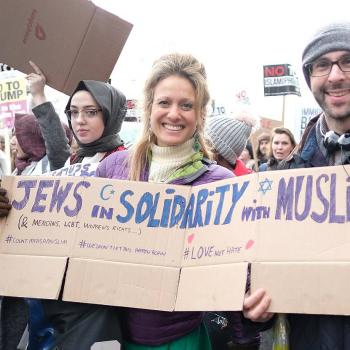 |
|
State Senator Saghir “Saggy” Tahir (R-NH)
|
On January 20, 2001, George W. Bush was sworn-in as the country’s 43 president. In one America’s closest elections, Muslim Americans were optimistic for the future. For the first-time ever, they had organized a coalition of major political and civic organizations, and based on Pres. Bush’s supportive position on a series of domestic and international issues important to the Muslim community, Muslim Americans offered a unified endorsement of the former Texas governor.
Then-Governor Bush readily met with Muslim American leaders, actively sought Muslim American support, and was the first presidential candidate to invite a Muslim to open a session of a national convention with a prayer. And in the second presidential debate, in response to a question regarding racial profiling by law enforcement, he sought out the opportunity to further condemn the Clinton administration’s use of “secret evidence” against individuals suspected of supporting terrorism.
Estimates vary, but between 75 and 80 percent of Muslim American voters supported Bush. Indeed, in Florida alone, an estimated 30,000 Muslims voted Republican. After his inauguration, President Bush met with prominent Muslim American leaders such as Dr. Muzammil Siddiqi, Shaikh Hamza Yusuf, and Imam Warith Deen Muhammad and was the first president since President Dwight Eisenhower, a Republican, to visit an American mosque when, just days after 9/11, he visited a mosque in Washington, DC and warned Americans against anti-Muslim bigotry and violence. And throughout his term, President Bush has appointed several Muslim Americans to senior positions in his administration.
 A seat at the American political table – For me, the Democratic Party was a natural fit. For me the core values of my faith are belief in God, and to treat others as I would want to be treated. For me, the Democratic Party most closely embraces those values: A desire to help the poor through social programs. A desire to work in a more multilateral manner in the international community. (Read more…) |
|
Muslim Americans have come a long way. Just fourteen years before, a nascent group of Arab and Muslim political activists had organized a coalition and offered to endorse then Democratic Presidential candidate Walter Mondale. Shunning the group’s support, Mondale added insult to injury by encouraging Arab and Muslim Americans to vote Republican.
That was 1984; now its 2007, and another generation of Muslim Americans are faced with a host of candidates from both sides of the partisan aisle, not to mention the many third-party, vanity and fringe candidates. Not having lived under a rock the past several years, I’m fully aware of the anger and frustration many Americans, including Muslim Americans, feel toward our elected leaders in Washington. The war in Iraq, excessive spending, the rising cost of healthcare, and the urgent need for improvements in infrastructure in places such New Orleans and Minneapolis, to name a few, have caused many to shake their fist at the powers-that-be.
But if President Bush’s approval ratings are in the basement; the Democrat-controlled Congress, under House Speaker Nancy Pelosi and Senate Majority Leader Harry Reid, are exploring even deeper subterranean depths still. Exploiting voters’ frustrations into narrow victories in 2006, Democrats have done little to propose any solutions to our current challenges, whether foreign or domestic. If anything, they’ve embraced Reagan’s humorous yet fitting description of Democrats and their love of government: If it moves, tax it. If it keeps moving, regulate it. And if it stops moving, subsidize it. Just days after assuming control of congress, Democrats immediately set about proposing record increases in taxes on working Americans, increased economic and regulatory burdens on small businesses, and have utterly failed to propose any solutions to our challenges in Iraq, on healthcare, or for that matter, anything else.
And this brings us to the next election in 2008. Hillary Clinton supported and voted to go to war in Iraq, as did former candidates Joe Biden, Chris Dodd, and John Edwards. All are attempting to tap-dance around the fact now that the war has become unpopular. Regardless of how you felt about going in to Iraq, none of the Democratic candidates are providing an honest solution to the ongoing conflict.
Having missed the chance to vote on the war in Iraq, Barack Obama recently attempted to show his mettle claiming he’s open to bombing Pakistan. The remaining Democratic candidates — including Hillary Clinton and Barack Obama — favor significant increases in our taxes, government spending and power, strangling regulations and legal liabilities on small businesses and medical practices, a more secular anti-religious society, and limits on personal liberty and free trade.
For example, in a Democratic debate hosted by a gay, lesbian and transgender association in August, Edwards advocated mandating that public schools teach students that same-sex relationships are a healthy alternative to “traditional” marriage. Regardless of your position on homosexuality and same-sex marriage, most agree that this issue is better handled by parents according to their own personal moral and religious values, and not unknown public school administrators.
John McCain, Mitt Romney, Mike Huckabee, and Ron Paul stand for more individual freedom and opportunity. The Republican candidates support lower taxes, including preserving the Bush tax cuts, abolishing the death tax, keeping the capital gains tax at 15 percent or lower, and reducing the regulatory burden on all of us. The Republicans support reforming the tort laws so trial lawyers (like John Edwards) don’t threaten to bankrupt every doctor and small business owner in America. They stand for individual choice and freedom in healthcare, parental choice in education, religious freedom of expression, free trade, limited government and reduced government spending. In facing today’s many challenges, the Republican candidates look to empowering individuals and families, and not expanding the power and reach of the federal government.
For example, as Governor of Massachusetts, Republican candidate Mitt Romney successfully introduced a program providing universal healthcare for Massachusetts residents that provided a level of choice and quality that no single-payer socialized system could ever provide. Republican candidate Ron Paul has called for a less-intrusive foreign policy, especially in the Middle East, and John McCain has taken on the wasteful government spending including earmarks (a friend once remarked, “earmarks are the entry ‘drug’ for harder spending addiction”), corruption, and has fought against those calling for the use of torture.
Regardless of your party-registration or which candidate you support, its imperative that Muslim Americans remain engaged in the political process. Like our fellow-Americans, we deserve a seat at the table, but we must earn that seat through hard work, intelligent dialogue, and constructive engagement. In registering to vote, organizing strategic coalitions, and sustained political discourse, we will not only preserve and protect our cherished rights and freedoms, but we will contribute to our country and freedom-loving people everywhere.
Suhail A. Khan is a Washington, DC attorney and serves on the boards of the American Conservative Union, the Islamic Free Market Institute and the Indian American Republican Council.















